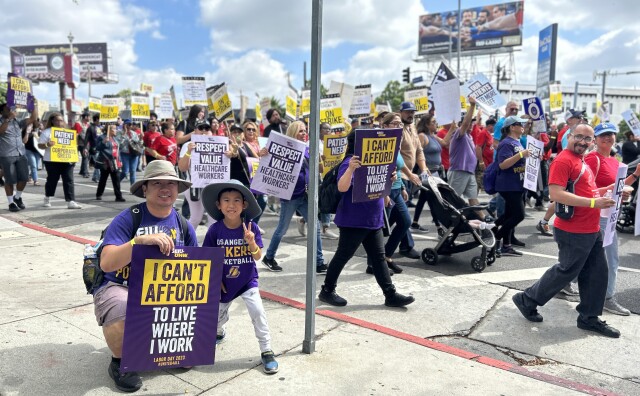Thinking about 2020 and the low points of the pandemic, Milana Burdette of L.A. remembers the social isolation and widespread confusion that she and so many others had to deal with.
“It was a traumatizing year,” she said. “People were preoccupied with themselves.”
That makes it hard when you need someone to talk to. And getting a professional to help her with her mental health hasn’t been any easier, even as COVID-19 has loosened its grip somewhat on Southern California.
Experts say a variety of obstacles stand in the way of those seeking mental health support, including a shortage of therapists, especially therapists of color, a lack of awareness among primary care doctors about available services, and hard-to-navigate websites.
Burdette said she’s had difficulty getting therapy through her health insurer, Kaiser.
“I told them I wanted to see someone weekly and they couldn’t provide that,” she said.
Going In Circles
In 2013, the state fined Kaiser $4 million for not providing timely access to mental health care and the insurer has been cited two times since then for not fixing the problem.
For Burdette, it felt like she was going in circles trying to get the mental health care she needs. She tried paying out of pocket, but private practices told her they’re full. So for now, Burdette’s put therapy on the backburner.
A 2019 California Health Care Foundation poll found that more than half the number of people who tried to get a mental health appointment believed they had to wait longer than was reasonable.
The determination is there, the drive is there, but there’s a shortage of therapists.
"The determination is there, the drive is there, but there’s a shortage of therapists,” Burdette said.
According to a recent CDC study, people are experiencing less anxiety and depression than they were last year, a few months after COVID-19 first hit. But things are still worse than they were before the pandemic.
A Dearth Of Black Therapists
Dr. Tonya Wood, former president of the California Psychological Association, said her L.A.-based practice has seen an increased demand for services, especially for therapists of color.
“We definitely experienced that last summer at the height of some of the social protests that were going on,” Wood said. “There was a lot more demand for ... African American therapists.”
Wood says part of the problem is a dearth of Black therapists: One study found that in 2015 only 4% of American psychologists were Black. And even as people are going back to work and kids are going back to school, anxiety and depression are still widespread.
“I think that maybe we’ve underestimated the post-COVID mental health needs of people,” Wood said.
'The Need Is Really High'
Part of the problem is that barriers to treatment within the mental health care system that existed before the pandemic haven’t gone away, even as frequency of symptoms have increased.
“The need is really high, but access is really low,” said Carolina Valle, policy director for the California Pan-Ethnic Health Network.
Her group conducted listening sessions with 140 people last fall and this spring.
“We hear a lot about how hard it is to just get started,” Valle told us.
Primary care physicians who play an instrumental role in helping their patients get connected to care had very low awareness of mental health services provided by the health plan.
For one, navigating health plan websites, like those offered through Medi-Cal, can be very difficult for people seeking therapy or other services with a provider who speaks their language.
Valle’s nonprofit also interviewed a number of primary care physicians on their role in trying to get patients access to mental health services through their health plan.
“One of the top findings was primary care physicians who play an instrumental role in helping their patients get connected to care had very low awareness of mental health services provided by the health plan,” she said.
A New Law Will Provide Some Help
Valle believes legislation recently signed into law by Gov. Newsom is a big step in the right direction. Insurers were already required to provide an initial mental health assessment within 10 business days, now under the new law follow-up sessions will have to happen within 10 days too.
But the law doesn’t go into effect until next summer.
In the meantime, people like Milana Burdette are left searching.
“I’m at a point where I understand that I have a lot to work through, but because I haven’t really had access to affordable care, I’ve had to take care of myself through other ways,” she said.
For now that means reading books on mental health. Burdette also started speaking up about her frustration with how hard it’s been to get help — she filed a complaint with Kaiser.










